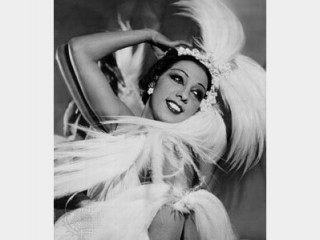
Josephine Baker biography
Date of birth : 1906-06-03
Date of death : 1975-04-12
Birthplace : St. Louis, Missouri, U.S.
Nationality : American
Category : Arts and Entertainment
Last modified : 2010-07-14
Credited as : Cabaret music and jazz singer, actress, Bronze Venus , Black Pearl
4 votes so far
Baker was the first African American to star in a major motion picture, to integrate an American concert hall, and to become a world-famous entertainer. She is also noted for her contributions to the Civil Rights Movement in the United States (she was offered the unofficial leadership of the movement by Coretta Scott King in 1968 following Martin Luther King, Jr.'s assassination, but turned it down), for assisting the French Resistance during World War II and for being the first American-born woman to receive the French military honor, the Croix de Guerre.
"Sidelights"
Josephine Baker started her career in show business while still in elementary school when she began dancing part-time in a chorus line. As a teenager she joined a traveling troupe and wound up in New York City dancing in the chorus line of the musical comedy "Shuffle Along." She performed on Broadway and appeared at the Plantation Club before accepting a dancing part in "La Revue negre," an American production that opened at the Theatre de Champs-Elysee in Paris in 1925. Soon after, she launched her own act at the Folies-Bergere and created a sensation by dancing naked except for a girdle of bananas around her waist. In addition to her music-hall career, Baker was featured in motion pictures, including "Zouzou" and "La Sirene des tropiques," and starred in "La Creole," an operetta about a Jamaican girl. Critical of American racial discrimination, the black entertainer became a French citizen in 1937 and worked for the Resistance during World War II as a lieutenant in the Free French Air Force in North Africa. For her service to France, she was made a chevalier of the French Legion of Honor and was awarded the Croix de Guerre and the Rosette de la Resistance. Baker continued her nightclub career until her death, but she was chiefly involved after the war with raising her adopted children, twelve orphans from various countries. In 1951 she was named the NAACP's Woman of the Year. Her writings include Voyages et adventures de Josephine Baker and Les Memoires de Josephine Baker, with Marcell Sauvage.
AWARDS
Croix de Guerre; Rosette de la Resistance; Legion d'Honneur; named Woman of the Year by the NAACP, 1951.
CAREER
Entertainer and author. Began dancing in a chorus line part-time as a child; joined a traveling dance troupe as a teenager, eventually performing in New York City on Broadway and at the Plantation Club; performed in "La Revue negre" at the Theatre de Champs-Elysee in Paris, 1925; created her own music hall act at Folies-Bergere; appeared in motion pictures; starred in the operetta "La Creole"; lieutenant in the Free French Air Force for the French Resistance during World War II; continued to perform in night clubs until the time of her death.
WRITINGS BY THE AUTHOR:
* (With Jo Bouillon) Josephine, translated from French by Mariana Fitzpatrick, Harper & Row (New York, NY), 1977.
Also author of two autobiographical memoirs in French with Marcell Sauvage.
















